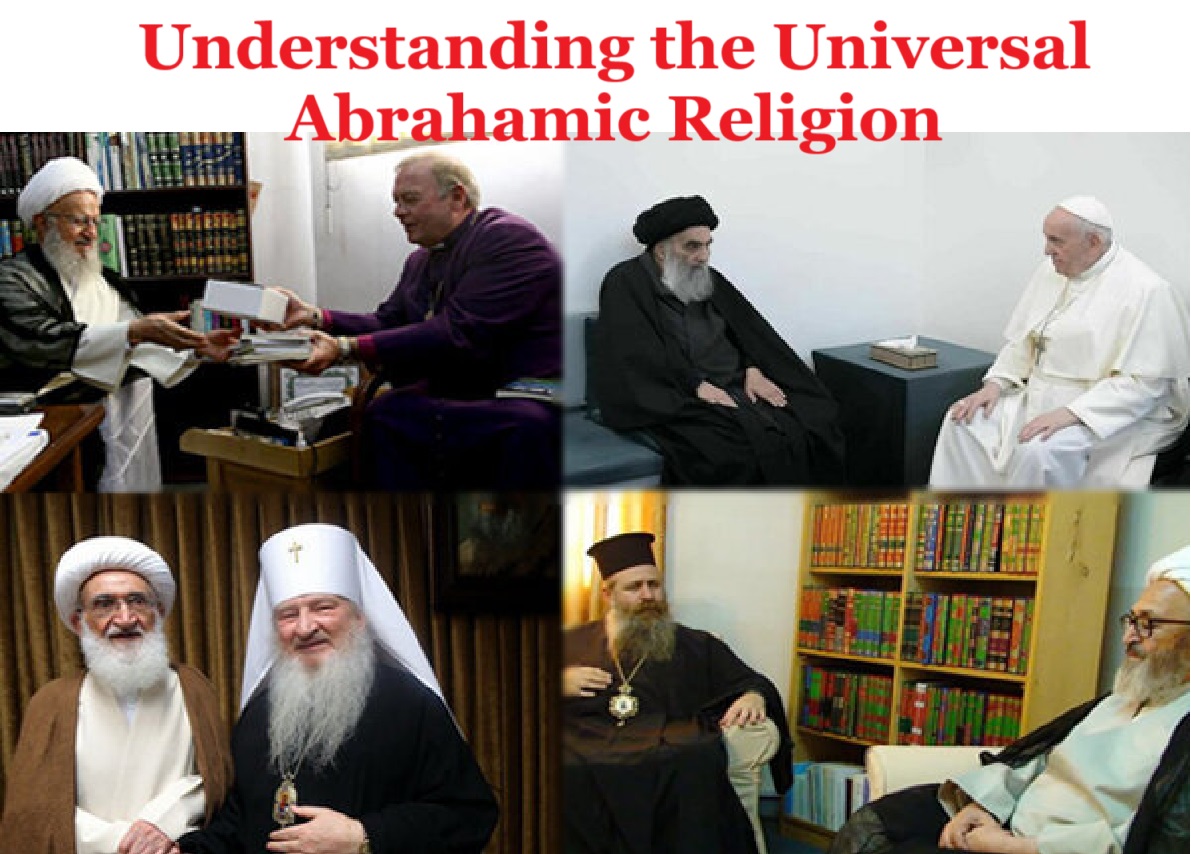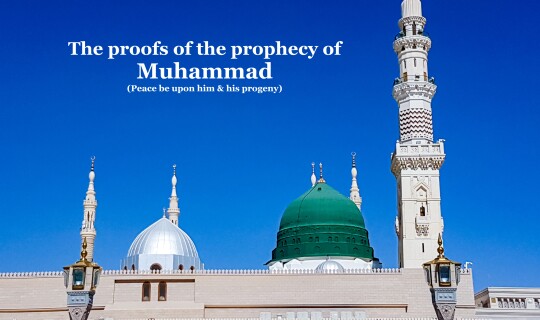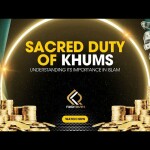Understanding the Universal Abrahamic Religion: Bringing Together Ahl al- Kitab and Attracting their Attention to the Need for Unity
Text of the speech of Professor Muhammad Taqi Ja‘fari at the conference on Islam and Christianity held in Switzerland on the November 27th, 1995. A major portion of this speech was first presented on the March 7th 1985, at the Society of Wisdom and Philosophy, Tehran. Translator: Bahador Shirazian; Editor: Yogi Sikand
The First Discussion
One of the most important religiously obligatory demands today is a proper understanding of the universal Abrahamic religion and its purification from the influences that have covered this divine religion through the centuries. This is because this universal religion of God, which was preached by our forefather, the Prophet Abraham (pbuh), is the same religion which has united all of us Ahl al-Kitab through general and common principles. These common principles, which form our general beliefs, are: Unity, Prophecy, Resurrection, Divine Duties, Human Rights and Ethics.
These beliefs are the saviour of humankind from fatal nihilism, which has closed the doors of hope for people to enter the felicitous life and the better future that is the most genuine wish of humankind.
The need to properly understand the universal divine religion is not imposed on us only by the developments of our present time. Rather, this need is stressed in the divine books which invite all of us Ahl al-Kitab to enjoy a common felicitous material and spiritual life. If Ahl al-Kitab had paid necessary attention to these texts, there would have been no Crusades or other such wars in the name of religion.
As the Holy Qur’an says:
Those who believe (in the Qur'an), those who follow the Jewish (scriptures), and the Sabians and the Christians,- any who believe in Allah and the Last Day, and work righteousness,- on them shall be no fear, nor shall they grieve.(5:69).
Elsewhere, the Holy Qur’an says:
Say: "O People of the Book! Come to common terms as between us and you: That we worship none but Allah. That we associate no partners with him; that we erect not, from among ourselves, Lords and patrons other than Allah." If then they turn back, say ye: "Bear witness that we (at least) are Muslims (bowing to Allah’s Will).(3:64).
This unity is the goal of Ahl al-Kitab. The universal Abrahamic religion, as the Quran suggests in the following words, harkens to the need for building precisely this unity:
So We have taught thee the inspired (Message), "Follow the ways of Abraham the True in Faith, and he joined not gods with Allah."(16:123).
The unity of the goals of all the prophets of God (pbut) and the need for following all the prophets is mentioned in Qur’an as follows:
The Messenger believeth in what hath been revealed to him from his Lord, as do the men of faith. Each one (of them) believeth in Allah, His angels, His books, and His apostles. "We make no distinction (they say) between one and another of His apostles." And they say: "We hear, and we obey: (We seek) Thy forgiveness, our Lord, and to Thee is the end of all journeys." (2:285).
The unity of meaning and goals of the divine books is also mentioned in the Holy Qur’an as follows:
It was We who revealed the law (to Moses): therein was guidance and light. By its standard have been judged the Jews, by the prophets who bowed (as in Islam) to Allah’s will, by the rabbis and the doctors of law: for to them was entrusted the protection of Allah’s book, and they were witnesses thereto: therefore fear not men, but fear me, and sell not my signs for a miserable price. If any do fail to judge by (the light of) what Allah hath revealed, they are (no better than) Unbelievers.( 5:44).
Further, the Holy Qur’an says:
And in their footsteps We sent Jesus the son of Mary, confirming the Law that had come before him: We sent him the Gospel: therein was guidance and light, and confirmation of the Law that had come before him: a guidance and an admonition to those who fear Allah. (5:46).
To thee we sent the Scripture in truth, confirming the scripture that came before it, and guarding it in safety: so judge between them by what Allah hath revealed, and follow not their vain desires, diverging from the Truth that hath come to thee. To each among you have we prescribed a law and an open way. If Allah had so willed, He would have made you a single people, but (His plan is) to test you in what He hath given you: so strive as in a race in all virtues. The goal of you all is to Allah. it is He that will show you the truth of the matters in which ye dispute;(5:48).
The Abrahamic religion, which is meant for all nations of the world, has been affirmed in the Torah several times, such as in the following verses:
God said to Abraham: “Get you out of your country, and from your kindred, and from your father's house, to the land that I will show you. That I will make of you a great nation, and I will bless you, and make your name great; and be you a blessing. And I will bless those who bless you and anyone who curses you I will curse; and by you all the people of the earth will be blessed.”
God said to Abraham, after that Lot was separated from him: “Lift up now your eyes, and look from the place where you are, northward and southward and eastward and westward; for all the land which you see, to you I will give it, and to your ancestry for ever. And I will make your ancestry as the dust of the earth; so that if a man can number the dust of the earth, then shall your ancestry also be numbered. Arise and walk through the land in the length of it and in the breadth of it; for to you I will give it.”
The New Testament says:
And I say to you that many shall come from easts and wests, and shall sit down with Abraham, in the kingdom of heaven.
Paul declared: Circumcision doesn’t make a person child of Abraham, but his children are those who walk with the steps of faith. And Abraham is our father and God has made him the father of several nations.
The Second Discussion
The study of the unity of the universal religion of Abraham (pbuh) begins with the premise that our purpose in stressing this unity is not so that all Ahl al-Kitab believers renounce their own respective religions in order to participate in a universal Abrahamic religion. Not at all! Rather, our view is that each religious community has its own religion and considers it binding to be observant of its beliefs and duties. A Muslim is a Muslim, a Christian is a Christian, and a Jew is a Jew.
Our purpose in highlighting this universal religion is to unite all of us fellow followers of Abraham on the basis of common principles that are acceptable to all of us. These common principles are: Belief in God, His perfect attributes, resurrection and eternity, the angels, religious duties (worship and the like, according to a person’s religion), morality and ethics.
The goal of fostering unity between Ahl al-Kitab on the basis of the Abrahamic religion must be based on extensive and deep knowledge of this religion and of the divinely-revealed texts. Naturally, such knowledge cannot be acquired in a short time or simply through some conferences and meetings.
The purpose of this conference is not to issue an official statement of peace in order for the adherents of Abrahamic religions to announce the end of the Crusades between Christians and Muslims, as some people might assume. There is no disagreement about the lofty moral and humanistic duties based on the common beliefs that I have outlined above in order for us to issue a resolution for uniting them and announcing the end of war and beginning of peace.
If properly understood, the universal Abrahamic religion considers all humans as brothers and sisters, and there should be no enmity and hatred between them. It is extreme selfishness that leads to such enmity and hatred. This is what separates people from each other and makes them confront one another like ferocious enemies. This evil characteristic is the result of being far from God, who is the most essential factor for the unity of human beings.
Other causes of this sort of conflict include racism and the desire to dominate others and seeing others simply as a means to one’s ends. These are actually a result of extreme selfishness. Ignorance about lofty human values and the truth of religion also lead to conflict. Often, human beings completely negate, through their actions, the truths of religion, rights and justice by engaging in conflict ironically in the name of protecting religion, rights and justice. This has led to horrendous bloodshed on a vast scale.
Today, it is obligatory for us to work towards resolving such conflicts, for which it is crucial to highlight the unity and common consensus of Ahl al-Kitab with respect to Abraham (pbuh) and his universal religion.
The Third Discussion
Resources and references that can introduce the Abrahamic religion to us are among the most important subjects which this conference should seek to examine. These resources and references are of two kinds:
a) Holy books in which Ahl al-Kitab believe and to which they refer for their beliefs, duties and ethics.
b) Pure essence and wisdom, free from the pollution and error.
The holy books include the Qur’an, the Bible and the Torah. Evidently, some explicit principles and issues are not mentioned as beliefs, duties, rights and ethics of the religion of Abraham (pbuh), but in these books the foresaid truths will be derived from cases and characteristics which refer to Abraham (pbuh), such as knowledge, justice, management, lofty ethics and the like. These acts, expressions and thoughts either refer to duties and orders issued by God or rely on a pure conscience that demands adherence to truth.
The Holy Qur’an indicates the following characteristics of the Prophet Abraham, which we can call lofty Abrahamic characteristics:
1) Honesty in expression, acts and thought (Maryam, 19:41).
2) Victory in the face of the toughest examinations (Baqara, 2:124).
3) Purification of the house of God and preparing it for worship (Baqara, 2:125).
4) Passion for security, peace and harmonious living for people (Baqara, 2:126).
5) Returning (in repentance) to God (Baqara, 2:128).
6) Believing in Islam (that is to say, the religion of the essence of Nature) (Baqara, 2:128, 2:131 & 2:132).
7) Teaching worship and divine duties (Baqara, 2:128).
8) Passion for educating people to recite divine verses and teaching wisdom to them and purifying them (Baqara, 2:129).
9) Encouraging growth and perfection (Baqara, 2:130).
10) Following pure faith, which relates to the pure essence of Nature and humanity (Baqara, 2:135 & 2:138 and Aal e- Imran, 3:67).
11) Believing in Unity (Baqara, 2:135 & 2:138 and Aal e- Imran, 3:64).
12) Genuine friendship, which is the result of closeness to God, indicated by proper belief and righteous acts (Nisa’, 4:125).
13) Announcing disagreement with polytheists (An’aam, 6:74 and Tawbah, 9:114).
14) Having vision of heavens and earth (An’aam, 6:75).
15) Achieving a level of certainty (about God and divine truths) (An’aam, 6:75).
16) Emphasizing wisdom and reasoning for proving the truth (An’aam, 6:76-79).
17) Observing politeness and respectfulness during discussion and reasoning (An’aam, 6:67-79).
18) Offering the surest way for beliefs (An’aam, 6:80- 83).
19) Purity in worship of Almighty God (An’aam, 6:162).
20) Justifying life and death only for the sake of God (An’aam, 6:126).
21) Patience (Tawbah, 9:114).
22) Praying to God (Tawbah, 9:114).
23) Being merciful and kind towards people (Ibrahim, 14:36).
24) Easy religious law, without hardship (Hajj, 22:78).
25) Ascribing creation, guidance, feeding, healing, life and death to God. This ascription is related to the general rule, La Hawla wa la Quwwata illah Billah (Shuara, 26:78-81).
26) Accepting God as the Absolute Governor (Shuara, 26:78-81).
27) Reliance on God (Mumtahina, 60:4).
28) Believing in the fact that the final destination of all people is God (Mumtahina, 60:4).
29) Believing in the fact that growth and perfection are bestowed by God (Anbiya, 60:51).
Characteristics of the Prophet Abraham (pbuh) from the Point of View of the Torah and the Bible
There are characteristics ascribed to the Prophet Abraham (pbuh) in the Torah which show his achievement of the highest level of growth and perfection, as indicated in the following:
1-Abraham is the progenitor of a ‘great nation’ (Torah, Genesis 12: 1-3)
We can also see this characteristic in the Holy Qur’an, which says:
Abraham was indeed a model, devoutly obedient to Allah, (and) true in Faith, and he joined not gods with Allah. He showed his gratitude for the favours of Allah, who chose him, and guided him to a Straight Way. And We gave him Good in this world, and he will be, in the Hereafter, in the ranks of the Righteous. So We have taught thee the inspired (Message), "Follow the ways of Abraham the True in Faith, and he joined not gods with Allah." (16: 120-123).
2-God has blessed Abraham (Torah, Genesis 12: 1-3).
3-God has blessed all people on the earth by Abraham (Torah, Genesis 12: 1-3).
4-The religion of Abraham will cover the earth, from the north to the south and from the east to the west (Torah, Genesis 12: 1-3).
5-God appeared to Abraham and Abraham saw Him (Torah, Genesis 17:1).
6-Abraham reached perfection (Torah, Genesis 12: 2).
7-God granted Abraham the covenant of prophecy and leadership over all nations (Torah, Genesis 12: 6). Abraham (pbuh) has been mentioned in the New Testament more than thirty times. These references praise him, as indicated in the following assertions:
1) He is the father of all nations.
2) He is a special friend of God.
3) His nation will inherit the earth.
From what has been mentioned in Qur’an, Bible and Torah about Abraham (pbuh), it will be noticed that these holy books agree about the fact that he is the father of all of us Ahl al-Kitab. If be believe in the religion of this great prophet who was sent by God, we will be in harmony through the universal Abrahamic religion, which is the religion of the pure essence of Nature and wisdom.
Today, we testify that we are at the beginning of the process through which Almighty God can help us all in the quest to arrive at religious unity by moving in this direction. We should not fear the problems that might arise on the way, because we are duty- bound to tread this path to felicitous life. For this purpose, we need to properly reflect on and interpret the holy books in order to comprehend the universal Abrahamic religion, relying on God alone for this purpose.
May God bless you all.
Answer to a Swiss gentleman who claimed during the conference that Christians fear Islam
On the second day of the conference about Islam and Christianity, the mayor of the town of Biel/Bienne, where the conference was held, explicitly mentioned the fear that Christian brothers had of Muslims.
Professor Ja‘fari answered him as follows:
There is no reason for Christians to fear Muslims or for Muslims to fear Christians, because these two groups are brothers, sharing common beliefs about God, Eternity and lofty morals. Based on these shared principles, the followers of these two religions have lived in peace throughout the centuries, except during the Crusades, which were not the result of religion, as will be evident from a proper study of history.
On the other hand, possible factors for such fear are cultural and economic domination and so on, which unsettle healthy mutual relations, leading to domination over others. A major cause of anxiety and worry in this regard are the policies and stances of the mass media, which present a distorted image about Muslim societies. Do you know what we should fear? We should fear ignorance. As has been mentioned in both the Islamic as well as Christian traditions, ignorance is a great source of fear and conflict. Thus, Mutanabbi says:
There is a treatment for any illness except ignorance, which has made anyone who wants to heal it incapable.
The world is shrouded by a thick veil that does not permit us to be informed about the true nature and conditions of each other and of what we Muslims and Christians share in common, especially in our holy books. Without knowledge and recognition of these commonalities we will be incapable of having a mutually-enriching and beneficial religious, cultural and economic life.
I believe that if we Muslims and Christians cannot successfully achieve an agreement about the things that unite us, future human beings and history itself will not forgive us, for this agreement is really indispensable.
Do you presume that we need anything more than what is mentioned in our holy books for proving our religious brotherhood as followers of the Prophet Abraham (pbuh)?! All of us are the children of Abraham (pbuh), the special friend of God, who preached the divine religion, which the Qur’an indicates is the religion of pure essence of Nature.
It is obligatory for me to acknowledge those who have organized this conference, especially Professor Galtung, the respected director of the conference, who made several very valid points with excellent precision.
Ending the Crusades
The declaration of the Conference on Islam and Christianity
The Announcement of Peace
We have gathered in here, in Biel/Bienne, Switzerland, on November 27th, 1995 according to the Christian calendar. Nine hundred years ago, in 1095, Pope Urban II, launched the first Crusade, the first of a series that finally gave over nearly two centuries later, in 1291. Yet, we have never had a real announcement of peace, and the Crusades continued to be used throughout later history as a religious justification for such forms of hatred and violence. Even today, some people insist on reviving the memories and extremist mentality of the Crusades. It is our duty to work together in order to combat this and to end this Crusader way of thinking and feeling.
Supporters of Christianity ask for forgiveness from Muslims, Eastern Christians and Jewish brothers and sisters for the destruction, bloodshed and inclemency which were imposed by them during the Crusades.
We want to focus on our common history and future. We encourage historians to research the relations between Islam and Christianity and to highlight the bright sides of this relationship more than the darker aspects. We should value the positive aspects of this relationship in our educational system instead of enmity and revenge.
We feel sorry for the victims of violence. Let a hundred thousand blossoms bloom in the form of inter-religious dialogue between Christians, Muslims and followers of other religions at all levels, so as to remove their mutual fears, attract them closer, enable them to know each other better, remove their misunderstandings and solve their common problems. We should strive to address our disagreements while respecting each other.
We should have the courage to discuss about the fears on both sides. We commiserate with all hapless victims of violence. We ask religious leaders to abstain from violence and war in the name of religion. Such violence is to be decried because the Qur’an and the Bible insist on dialogue and abstaining from violence. Let us confront the accusation that Christianity and its adherents and Islam and its followers are necessarily, and forever, mortal enemies who must forever be locked in a Crusade.
We decry any kind of political pressure. Those who live among us should be accepted completely. Christians and Muslims are neighbors geographically, and even today our lives depend on each other.
We decry any kind of economic exploitation. We are promoters of social justice, and we should get together to fight injustice, inspired by religion to do so, and to work for peaceful coexistence.
Communiqué of the Conference on Islam and Christianity
The communiqué which was issued at the end of the conference began with the following sentence:
More concretely, the adherents of Islam and Christianity propose the following [...]
This sentence did not contain any mention about the divinity of both religions. Therefore, the sentence was changed to the following form at the suggestion of Professor Ja‘fari:
More concretely, the followers of the divinely revealed messages of Islam and Christianity propose the following:
• To try to understand other religions the way their followers understand themselves as a condition for true dialogue;
• To develop school material in history, civic education and religious education, particularly material about the two religions, acceptable to all parties;
• Not to abuse the freedom of speech when speaking and writing about other religions;
• To work together to identify, develop further and put into practice an inspiring ethic of peace, liberty, social justice, family values, human rights and dignity, and nonviolent forms of conflict resolution;
• To establish permanent inter-religious councils to further mutual respect and understanding;
• To cooperate across religious borders in Bosnia to reconstruct the country;
• To discuss with people in the media the need for more responsible, peace-promoting forms of journalism.
On this day of the ninth centenary of the call for the first Crusade, we call upon Christians, Muslims and all others, to go beyond mere tolerance. We must open our hearts and minds to each other.
Instead of sensing danger when somebody is different, let us be filled with joy at the opportunity to learn, to enrich and be enriched, to live in peace and create peace. Like everything else, the two largest religions in the world are also subject to development. While keeping the basic message of devotion, let us find new ways, acts and words.
It is within the spirit of freedom of interpretation of one’s own religion that genuine respect for other religions can evolve.
Let the next 900 years and beyond be an era of active peace built in our hearts and our minds, and enacted in our deeds.











